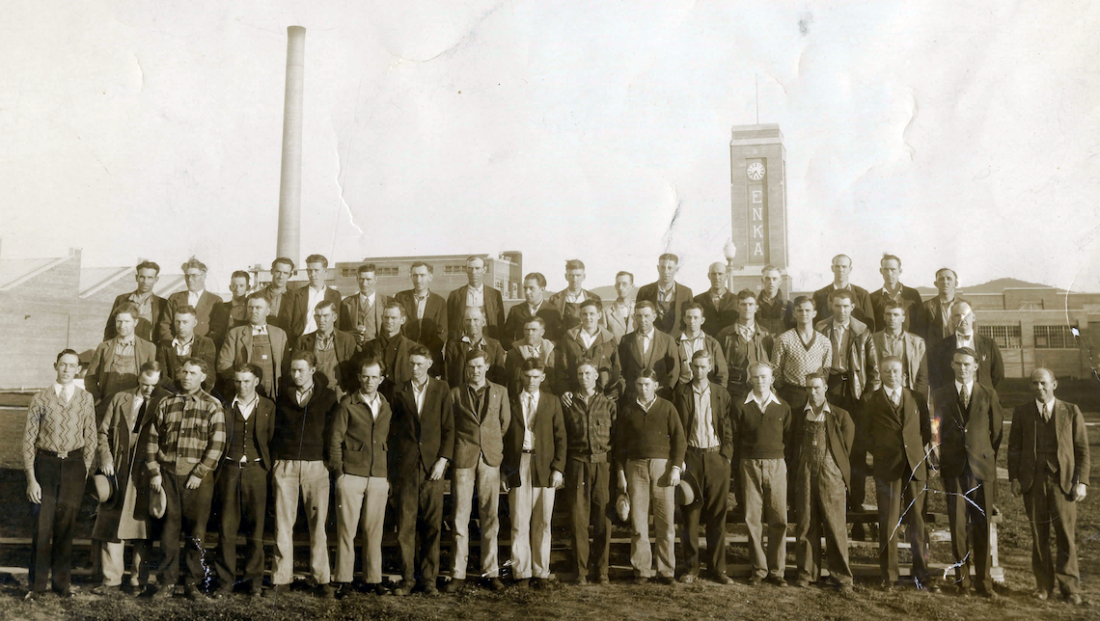On March 22, 1941, at least 1,500 union workers walked out of the American Enka Corp., a rayon manufacturer that operated in Asheville from 1929-85. Wages, working conditions and paid time off were among the issues employees demanded management address.
In the following day’s paper, The Asheville Citizen described the strike’s ongoing scene. “Picket lines to all the entrances to the plant were established by the strikers yesterday afternoon and last night there was a solid wall of men at every entrance,” the article read. “Several hundred men stood about the entrances and around fires that had been built just off the Enka corporation property, while coffee and sandwiches were served to those on the picket lines, and a sound truck furnished music.”
Wasting no time to make its case to the public, American Enka ran an open letter in the same issue. According to the corporation, management had been in ongoing negotiations with union leaders for nearly two months before the strike. “As one Union leader expressed it during our conference, they asked for ‘everything except the keys to the plant,’” the letter claimed.
Nevertheless, the letter stressed the corporation’s confidence that a timely resolution would be met.
In the same day’s paper, an editorial described the strike as “an unfortunate occurrence which will excite widespread regret.” Along with lost production and wages, the editorial noted, “The business houses of this section will lose patronage as a consequence of the stoppage in the earning power of so many people.”
But like the corporation itself, the editorial seemed optimistic about a quick and peaceful resolution. Neither the employees nor management would incite violence, the paper assured readers. Therefore, the editorial concluded, the strike “will not be marred at any stage by outbreaks of lawlessness.”
As the dispute dragged on, the paper continued to stress and promulgate a peaceful demonstration. “No strike has ever been won in this section by violent measures,” a March 26, 1941, editorial read. “On the contrary many strikes have been lost through such tactics.”
Despite the paper’s warning, at least one instance of violence was reported. On April 1, The Asheville Citizen noted that union members overturned a vehicle that attempted to drive through the picket line. The article did not note any injuries.
Finally, on April 3, after nearly two weeks, a deal was made during a late-night meeting at the George Vanderbilt Hotel in downtown Asheville. Though neither side of the negotiations disclosed the terms of the agreement, the paper noted Enka’s plans to reopen the following day. The strike, the paper reported, ultimately affected more than 2,300 workers.
To celebrate the strike’s end, union members staged an impromptu parade down Patton Avenue and Haywood Street the following day.
On April 5, The Asheville Citizen ran its final editorial on the matter.
“The American Enka Corporation is the largest industry in this section,” the paper wrote. “Any development which affects adversely the interests either of this corporation or its employes is naturally a matter of lively concern to all of the people of this region. The news that the strike has been ended will, therefore, be highly satisfying to the citizens of Western North Carolina.”
Along with satisfaction, at least one resident expressed pride in how events unfolded. In an April 9, 1941, letter to the editor, P.C. Edwards (whose son was among those on strike) praised both union President Nick Collins and Sheriff Lawerence Brown.
“[Collins] kept whiskey and beer out of the strike and had no trouble at all to amount to anything,” Edwards wrote. “Other strikes you read about are very unruly — always a killing or two before it is settled.”
Meanwhile, Brown deserved praise for not overwhelming the situation. “He had an idea there wouldn’t be any trouble, so he didn’t let it take all his time and men on the job,” Edwards wrote. “We didn’t need any army to keep down trouble.”
Editor’s note: Peculiarities of spelling and punctuation are preserved from the original documents.




It is good to remember what unions were able to accomplish with peaceful direct action, and what wise businesses were able to do to improve worker conditions while keeping their own profits flowing. That this strike resolved essentially without violence is notable–it was not the norm, but it was, and is, the ideal. Perhaps the time of the old-style labor union has passed–perhaps not–but in any case let’s not let the narrative be that unions failed workers, or businesses, or the American economy.